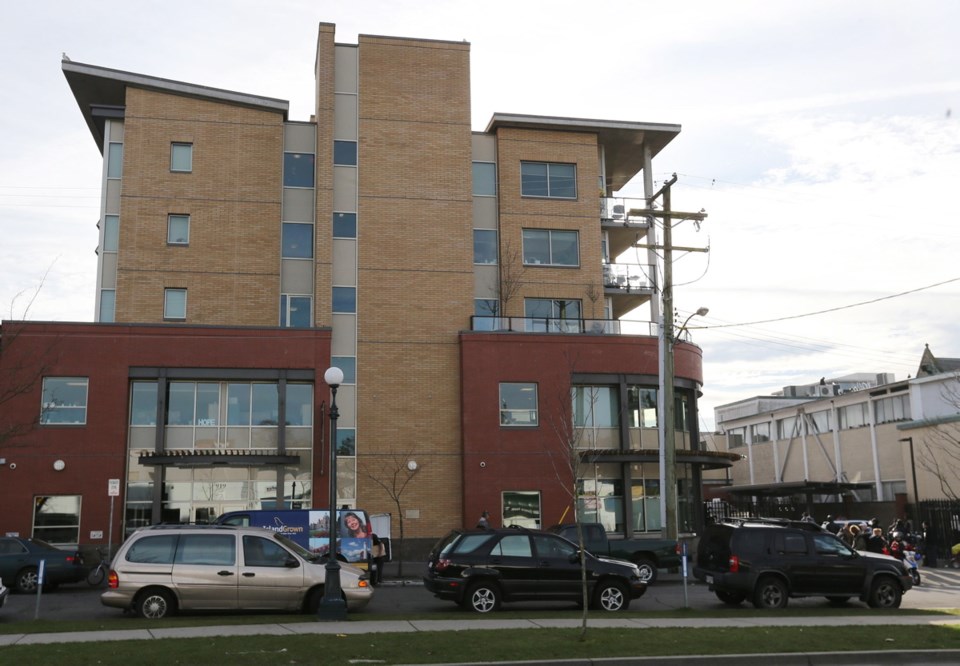The dysfunctional street scene outside Our Place can be so intimidating that some city crews are reluctant to conduct cleanups without police support, city councillors have been told.
Open drug use is rampant in the 900-block of Pandora Avenue as homeless people congregate outside the doors of the soup kitchen and drop-in centre. Some people camp in neighbourhood doorways, on the sidewalk and on nearby boulevards — often leaving trash and discarded belongings in their wake.
Not only is there a public-safety issue, those policing costs have to be included when calculating city costs associated with homeless people sleeping in parks and doorways, Victoria Coun. Geoff Young said.
Worries about city-worker safety came up during a meeting of neighbours and stakeholders of Our Place and the nearby 844 Johnson St. residence, which houses people who were living in Victoria’s now-disbanded tent city.
“The comment that was made came directly from the police and they said our engineering department cleanup crews will not clean up that street — they’re talking about downtown Pandora — unless the police have been there first and ensured their safety,” Young told councillors during budget sessions this past week.
Our Place CEO Don Evans, who attended the meeting, conceded that open drug use and people congregating outside is a concern, but said he doesn’t believe anyone is at risk.
“I walk by there all the time and I don’t feel that my safety is at risk,” Evans said.
“Obviously, with the open drug use, it creates an uncomfortable [situation] and anxiety for some people. I’m used to it. A lot of people aren’t.
“When you’re in that situation where you have groups of people that are using substances and there’s large numbers of people, it can worry you.”
Evans said the situation outside Our Place has been “challenging” — and those challenges will only increase as an estimated 500 units of housing are completed in the neighbourhood, bringing even more people to the area.
Our Place does what it can to keep a lid on the situation. Evans said needle sweeps are done every morning, and workers power wash the sidewalk in front of the building twice a day so people don’t get entrenched in one spot. Outreach teams are outside hourly, picking up garbage and encouraging people to move inside.
But many of the people congregating outside Our Place simply have no place to go. The only permanent solution, Evans said, is the provision of more low-barrier housing with supports — and that’s a provincial responsibility.
“What’s happening with public works and VicPD and ourselves is we’re trying to manage the situation there, but that’s not sustainable,” Evans said, noting that the problems could intensify once winter passes.
“We need to be looking to do something quickly, because we always see an influx of people in the summer congregating outside because it’s nicer weather.”
John Burrows, president of CUPE 50, the union representing city workers, said he’s not aware of any of his members refusing work on Pandora because of unsafe conditions.
However, he said the block “is a bit of a nightmare.”
“Certainly from the parks cleanup, we don’t do any of that unless the police are around. You don’t know whether you’re taking somebody’s lifelong belongings,” Burrows said.
Young’s comments came as councillors were considering — for the third year in a row — a “one-time” expenditure for cleanup and extended washroom hours necessitated by overnight sheltering in parks. City staff estimate 2019 costs will be $365,000.
“This is a big whack of money,” Young said. “But this money here is only a fraction of the total cost of overnight sheltering when you add up parks, non-park street-fronts, all our cleanup [costs], all of our bylaw [officer costs].”
Victoria has been trying to manage camping in parks since 2008, when a B.C. Supreme Court judge deemed it unconstitutional to deny a person the right to erect shelter in the absence of available shelter beds.
Young has long advocated for the city to allocate money to ensure there are sufficient shelter beds so it can prohibit sheltering in parks and in storefronts. “The courts have said we are permitted to do that,” he said.
He acknowledged concerns about people not feeling safe in shelters, but said that a lack of shelter spaces means that those who might pose a threat are “in our parks and our doorways for our public to interact with. I don’t see quite how that is improving overall safety.”
The extra policing costs, he said, “are one cost that is probably not included in people’s calculus of the total cost of sheltering or rough sheltering outside of formal shelters.”
Coun. Charlayne Thornton-Joe, council liaison to the downtown, said the fact that city workers don’t want to clean near Our Place until police or bylaw officers have gone through the area is nothing new, and that the same procedure is followed in city parks.
Thornton-Joe said a supervised safe-inhalation room for people using drugs might reduce the crowd congregating on the street. Some use drugs near the supervised injection site at Our Place for safety reasons, but they are not allowed to smoke their drugs inside, she said.
She said the safety concerns of those in the area suggest that the police budget should not be cut, as some of her council colleagues want.
Coun. Ben Isitt suggested reducing the $365,000 budget for park-camping cleanup in order to allocate more resources to supporting the most vulnerable. “I would rather target the resources there and accept a potentially slightly lower level of service in the parks in terms of the impacts associated with sheltering,” he said.



